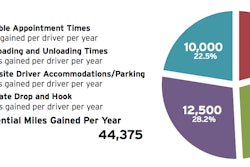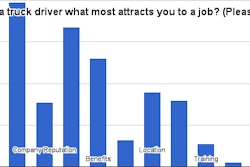
Since the change in the hours of service rule early in the last decade that brought in the rigid 14-hour duty day, detention at the loading docks has been a major pet peeve of drivers. In a poll last year on the biggest challenges for owner-operators, Overdrive readers voted uncompensated detention No. 3, following only the cost of fuel and the hours of service rule itself.
At the core of the issue: Everyone in the supply chain benefits from uncompensated detention time – except the driver. As Landstar-leased owner-operator John Scott says: “How the government ignores this is simply a dollars-and-cents thing to prevent upsetting the shippers and receivers. I know we don’t want to make products go up [in price] for consumers, so the end result is that drivers continue to absorb the lousy efficiency of our transportation system.”
Given the industry’s recent preoccupation with driver pay, progress could well be expected. There are government- and industry-centered solutions that could help – and in some cases already do.
Government solutions
Federal Motor Carrier Safety Administrator Anne Ferro has been upfront about her intent to use the “bully pulpit” to influence shippers and receivers. But Ferro also has stressed repeatedly that FMCSA lacks the authority to set rules for the docks. There have been some efforts by lawmakers – notably U.S. Rep. Peter DeFazio (D-Ore.) – to provide such authority with legislation that would limit detention, but all have died in a divided, distracted Congress.
“We need to take a close look at detention time” and DeFazio’s mandatory detention-pay bill “to figure out how we can make shippers be more accountable,” Ferro last year told the Trucking Solutions Group, a small band of high-profile owner-operators.
The agency is studying how it can combat the problem. Ferro has said she expected results in 2015, but agency spokesman Duane Debruyne recently confirmed that the study is on a bit faster tracks — results, he said, would be coming before the end of 2014.









